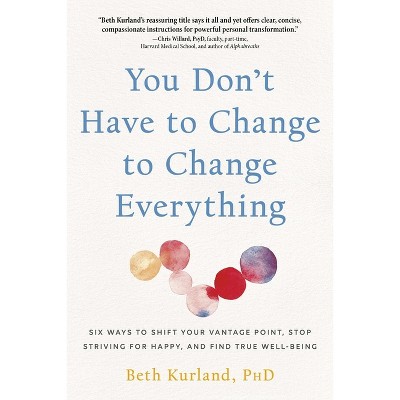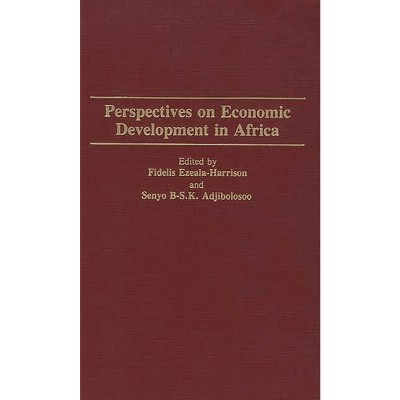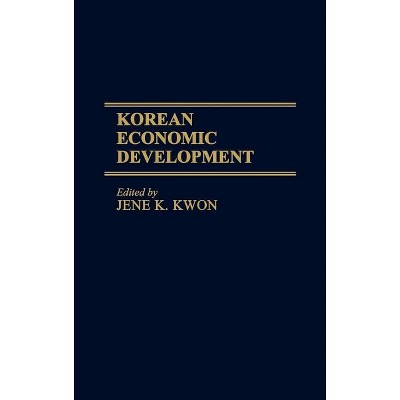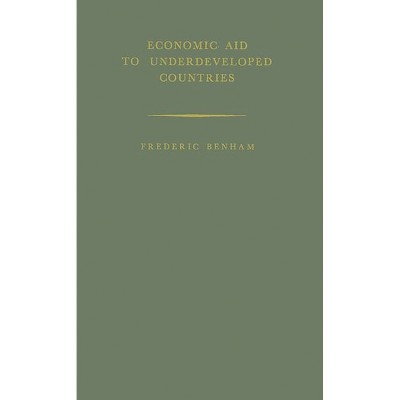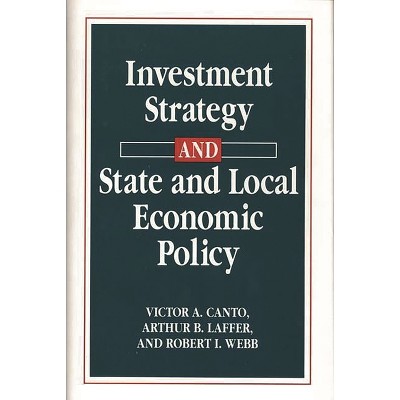Sponsored

Foreign Aid and Economic Development in the Middle East - by Victor Lavy & Eliezer Sheffer (Hardcover)
In Stock
Sponsored
About this item
Highlights
- The acquisition of large amounts of foreign aid, handled improperly by a struggling economy, can weaken rather than strengthen it.
- About the Author: VICTOR LAVY is a Senior Lecturer in the Department of Economics at The Hebrew University of Jerusalem.
- 184 Pages
- Business + Money Management, Development
Description
About the Book
The acquisition of large amounts of foreign aid, handled improperly by a struggling economy, can weaken rather than strengthen it. This study reaches this sobering conclusion by examining how the economic boom enjoyed by Egypt, Syria, and Jordan in the 1970s turned into financial crisis by the 1980s. The analysis involves the political, economic, and social similarities and differences among the three countries and pinpoints both the internal and external factors that contributed most significantly to their economic declines. Particular attention focuses on the huge influx of foreign aid thay reached the region from 1978 to 1981 and was used to advance purposes such as military buildups rather than to enhance future economic growth potential. This left all three countries, regardless of their unique political structures, in economic chaos when outside funds ran out.
The work outlines the economic developments and policies of Egypt, Syria, and Jordan during the years of prosperity and crisis. Central to the discussion are the short- and long-term ramifications of both this downturn and the countries' refusal to restrict military expenditures. After illustrating how foreign aid should, therefore, not be used, this volume then urges that countries not depend on outside capital for their economic well-being, and demonstrates how economic reform can be achieved only by initiating responsible economic programs. The hardships associated with such a reversal in policy are considered, especially in light of the current Gulf conflict, but scholars of economic development and Middle East studies will agree that the extended benefits of such an approach far outweigh any temporary setbacks.
Book Synopsis
The acquisition of large amounts of foreign aid, handled improperly by a struggling economy, can weaken rather than strengthen it. This study reaches this sobering conclusion by examining how the economic boom enjoyed by Egypt, Syria, and Jordan in the 1970s turned into financial crisis by the 1980s. The analysis involves the political, economic, and social similarities and differences among the three countries and pinpoints both the internal and external factors that contributed most significantly to their economic declines. Particular attention focuses on the huge influx of foreign aid thay reached the region from 1978 to 1981 and was used to advance purposes such as military buildups rather than to enhance future economic growth potential. This left all three countries, regardless of their unique political structures, in economic chaos when outside funds ran out.
The work outlines the economic developments and policies of Egypt, Syria, and Jordan during the years of prosperity and crisis. Central to the discussion are the short- and long-term ramifications of both this downturn and the countries' refusal to restrict military expenditures. After illustrating how foreign aid should, therefore, not be used, this volume then urges that countries not depend on outside capital for their economic well-being, and demonstrates how economic reform can be achieved only by initiating responsible economic programs. The hardships associated with such a reversal in policy are considered, especially in light of the current Gulf conflict, but scholars of economic development and Middle East studies will agree that the extended benefits of such an approach far outweigh any temporary setbacks.Review Quotes
?In this first report by the Israeli Institute for Applied Econimic Policy, which aims to promote peace in the Middle East region by economic means, two economists (Hebrew University, Jerusalem) focus on the negative effect of large and mainly transitory capital flows into Egypt, Syria, and Jordan. These countries are poor but differ significantly in economic and political structure as well as in ideology. Egypt is semi-centrally planned and a socialist economy; Syria is even more centralized. In contrast, Jordan is an almost capitalist, market-oriented society. US aid, financial support from other Arab countries, and remittances from nationals of recipient countries who work primarily in oil-producing countries of the Persian Gulf region are treated together as capital flows; however, tables provide full details that permit easy comparison, and also include data for Israel. The substantial funds received by the three countries are shown to have been wasted for lack of satisfactory infrastructure in all countries, together with a predominance of military expenditures and investment in large projects with low returns. After a brief period of growth, recessions set in, which the three countries tried to offset by large borrowings from abroad. Part 3 of the book makes general recommendations for policies and structural reforms to avoid such future calamities. These recommendations largely follow suggestions of the World Bank. For academic and large public library collections.?-Choice
"In this first report by the Israeli Institute for Applied Econimic Policy, which aims to promote peace in the Middle East region by economic means, two economists (Hebrew University, Jerusalem) focus on the negative effect of large and mainly transitory capital flows into Egypt, Syria, and Jordan. These countries are poor but differ significantly in economic and political structure as well as in ideology. Egypt is semi-centrally planned and a socialist economy; Syria is even more centralized. In contrast, Jordan is an almost capitalist, market-oriented society. US aid, financial support from other Arab countries, and remittances from nationals of recipient countries who work primarily in oil-producing countries of the Persian Gulf region are treated together as capital flows; however, tables provide full details that permit easy comparison, and also include data for Israel. The substantial funds received by the three countries are shown to have been wasted for lack of satisfactory infrastructure in all countries, together with a predominance of military expenditures and investment in large projects with low returns. After a brief period of growth, recessions set in, which the three countries tried to offset by large borrowings from abroad. Part 3 of the book makes general recommendations for policies and structural reforms to avoid such future calamities. These recommendations largely follow suggestions of the World Bank. For academic and large public library collections."-Choice
About the Author
VICTOR LAVY is a Senior Lecturer in the Department of Economics at The Hebrew University of Jerusalem. He has taught extensively in the United States and Israel, and has published many academic papers in such journals as Middle Eastern Studies, The Economic Journal, European Economic Review, and The World Bank Economic Review.
ELIEZER SHEFFER is a Teaching Associate Professor in the Department of Economics at The Hebrew University of Jerusalem. He contributed a chapter to the book Economic Cooperation in the Middle East.Shipping details
Return details
Trending Non-Fiction





